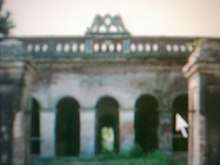Isfandiyar Khan Beg
Isfandiyār Khān Bēg (Persian: اسفندیار خان بیگ, Bengali: ইসপেন্দিয়ার খান বেগ), was the faujdar of Sylhet Sarkar from 1663 to 1665.

Isfandiyar Khan Beg | |
|---|---|
| Faujdar of Sylhet | |
| In office 1663–1665 | |
| Monarch | Aurangzeb |
| Governor | Mir Jumla II, Shaista Khan |
| Preceded by | Lutfullah Shirazi |
| Succeeded by | Syed Ibrahim Khan |
| Personal details | |
| Father | Allah Yar Khan |
Early life
Isfandiyar's father was Mirza Allah Yar Khan (also spelt Ilahyar, Allahyar or Ilah Yar) and his grandfather was Iftikhar Khan Turkmen (also known as Iftiyar), both of who took part in Islam Khan I's battle at Daulambapur, South Sylhet against Khwaja Usman in 1612.[1] Iftiyar died in this battle. Emperor Jahangir granted jagir to Allah Yar Khan, who died in 1650.[2]
Career
.jpg)
Following Mir Jumla II's conquest of Cooch Behar, Isfandiyar Beg was put in charge of governing the area and defeated the previous ruler, Pran Narayan. According to a sanad from Dhar Chowdhury of Pailgaon, Isfandiyar Beg had revenues in Sylhet in 1658.[3]
Isfandiyar Khan succeeded Lutfullah Shirazi as Faujdar of Sylhet in 1663. Isfandiyar was known to have destroyed the Adina Mosque replica in Sylhet town because the imam started Eid al-Adha prayers without waiting for him. However, after its destruction, Isfandiyar attempted to build another mosque in Dargah Mahalla. The ruins of this mosque can be seen today, behind the trees near the Dargah Gateway. Isfandiyar also officially recognised Shaykh Pir Bakhsh as the rightful khadim (guardian) of Shah Jalal's dargah, a descendant of Haji Muhammad Yusuf who was the dargah's first guardian.[4]
Isfandiyar granted land to Shah Kamal Estate of Durmut in Jamalpur.[2] Khan was succeeded by Syed Ibrahim Khan in 1665.
| Political offices | ||
|---|---|---|
| Preceded by |
Governor of Cooch Behar 1658-1663 |
Succeeded by |
| Preceded by Lutfullah Shirazi |
Faujdar of Sylhet 1663-1665 |
Succeeded by Syed Ibrahim Khan |
See also
References
- Nathan, Mirza (1936). Baharistan-i-Ghaibi. p. 23.
- Syed Murtaza Ali (1965). Hazrat Shah Jalal O Sileter Itihas. p. 92-94.
- Syed Mohammad Ali (1900). "A chronology of Muslim faujdars of Sylhet". The Proceedings Of The All Pakistan History Conference. 1. Karachi: Pakistan Historical Society. pp. 280.
- Chowdhury, Mujibur Rahman (2 Oct 2019). "গৌড়-বঙ্গে মুসলিম বিজয় এবং সুফি-সাধকদের কথা". Sylheter Dak.